- Home
- Madeleine L'engle
A Wind in the Door Page 8
A Wind in the Door Read online
Page 8
"We must think. We must think." Proginoskes's kythe almost became opaque for a second, and Meg felt that he was restraining himself from spouting fire.
Meg said, "Progo, if you really are a cherubim--"
There was a great and surging invisible wave of indignation all around her.
She hit the clenched fist of one hand against the palm of the other. "Wait. You told me to think, and I'm thinking."
"You don't have to think out loud. You don't have to talk to think, after all. You're deafening me. Try to kythe with me, Meg."
"I still don't understand kything. Is it like mental telepathy?"
Proginoskes hesitated. "You might say that mental telepathy is the very beginning of learning to kythe. But the cherubic language is entirely kything--with you, with stars, with galaxies, with the salt in the ocean, the leaves of the trees."
"But I'm not a cherubim. How do I do it?"
"Meg, your brain stores all the sensory impressions it receives, but your conscious mind doesn't have a key to the storehouse. All I want you to do is to open yourself up to me so that I can open the door to your mind's storehouse."
"All right. I'll try." To open herself entirely to the cherubim, to make herself completely vulnerable, was not going to be easy. But she trusted Proginoskes implicitly. "Listen," she said, "cherubim have come to my planet before."
"I know that. Where do you think I got my information?"
"What do you know about us?"
"I have heard that your host planet is shadowed, that it is troubled."
"It's beautiful," Meg said defensively.
She felt a rippling of his wings. "In the middle of your cities?"
"Well--no--but I don't live in a city."
"And is your planet peaceful?"
"Well, no--it isn't very peaceful."
"I had the idea," Proginoskes moved reluctantly within her mind, "that there are wars on your planet. People fighting and killing each other."
"Yes, that's so, but--"
"And children go hungry."
"Yes."
"And people don't understand each other."
"Not always."
"And there's--there's hate?"
"Yes."
She felt Proginoskes pulling away. "All I want to do," he was murmuring to himself, "is go some place quiet and recite the names of the stars ..."
"Progo! You said we were Namers. I still don't know: what is a Namer?"
"I've told you. A Namer has to know who people are, and who they are meant to be. I don't know why I should have been shocked at finding Echthroi on your planet."
"Why are they here?"
"Echthroi are always about when there's war. They start all war."
"Progo, I saw all that awfulness you took me to see, that tearing of the sky, and all, but you still haven't told me exactly what Echthroi are."
Proginoskes probed into her mind, searching for words she could understand. "I think your mythology would call them fallen angels. War and hate are their business, and one of their chief weapons is un-Naming--making people not know who they are. If someone knows who he is, really knows, then he doesn't need to hate. That's why we still need Namers, because there are places throughout the universe like your planet Earth. When everyone is really and truly Named, then the Echthroi will be vanquished."
"But what--"
"Oh, earthling, earthling, why do you think Blajeny called for you? There is war in heaven, and we need all the help we can get. The Echthroi are spreading through the universe. Every time a star goes out another Echthros has won a battle. A star or a child or a farandola--size doesn't matter, Meg. The Echthroi are after Charles Wallace and the balance of the entire universe can be altered by the outcome."
"But Progo, what does this have to do with our test--and with three Mr. Jenkinses--it's insane."
Proginoskes responded coldly and quietly. "Precisely."
Into the cold and quiet came the sound of the school buses arriving, doors opening, children rushing out and into the school building.
Charles Wallace was one of those children.
Proginoskes moved quietly in her mind through the roar. "Don't misunderstand me, Meg. It is the ways of the Echthroi which are insane. The ways of the Teachers are often strange, but they are never haphazard. I know that Mr. Jenkins has to have something to do with it, something important, or we wouldn't be here."
Meg said, unhappily, "If I hate Mr. Jenkins whenever I think of him, am I Naming him?"
Proginoskes shifted his wings. "You're Xing him, just like the Echthroi."
"Progo!"
"Meg, when people don't know who they are, they are open either to being Xed, or Named."
"And you think I'm supposed to Name Mr. Jenkins?" It was a ridiculous idea; no matter how many Mr. Jenkinses there were, he was Mr. Jenkins. That's all.
But Proginoskes was most definite. "Yes."
Meg cried rebelliously, "Well, I think it's a silly kind of test."
"What you think is not the point. What you do is what's going to count."
"How can it possibly help Charles?"
"I don't know. We don't have to know everything at once. We just do one thing at a time, as it is given us to do."
"But how do I do it? How do I Name Mr. Jenkins when all I think of when I see him is how awful he is?"
Proginoskes sighed and flung several wings heavenwards so violently that he lifted several feet, materialized, and came down with a thud. "There's a word--but if I say it you'll just misunderstand."
"You have to say it."
"It's a four-letter word. Aren't four-letter words considered the bad ones on your planet?"
"Come on. I've seen all the four-letter words on the walls of the washroom at school."
Proginoskes let out a small puff. "Luff."
"What?"
"Love. That's what makes persons know who they are. You're full of love, Meg, but you don't know how to stay within it when it's not easy."
"What do you mean?"
"Oh--you love your family. That's easy. Sometimes when you feel awful about somebody, you get back into rightness by thinking about--well, you seem to be telling me that you got back into love once by thinking about Charles Wallace."
"Yes--"
"But this time it can't be easy. You have to go on to the next step."
"If you mean you think I have to love Mr. Jenkins, you've got another think coming," Meg snapped.
Proginoskes gave a mighty sigh. "If we pass the test, you'll go on and be taught--oh, some of the things I was taught my first billennium with the Teachers. I had to pass a galaxy of tests before I could qualify as a Star Namer. But you're a human being, and it's all quite different with you. I keep forgetting that. Am I lovable? To you?"
All about Meg, eyes opened and shut; wings shifted; a small flame burned her hand and was rapidly withdrawn. She coughed and then sucked the burned place on her hand. But all she wanted was to put her arms around Proginoskes as she would around Charles Wallace. "Very lovable," she said.
"But you don't love me the way you love that skinny Calvin?"
"That's different."
"I thought so. That's the confusing kind. Not the kind you have to have in order to Name Mr. Jenkins."
"I hate Mr. Jenkins."
"Meg, it's the test. You have to Name the real Mr. Jenkins, and I have to help you. If you fail, I fail too."
"Then what would happen?"
"It's your first time with a Teacher. And it would be your last."
"And you?"
"When one has been with the Teachers as often as I have, one is given a choice. I could throw in my lot with the Echthroi--"
"What!"
"Quite a few of those who fail do."
"But the Echthroi are--"
"You know what they are. Sky tearers. Light snuffers. Planet darkeners. The dragons. The worms. Those who hate."
"Progo, you couldn't."
"I hope I couldn't. But others have. It's not an
easy choice."
"If you don't go to the Echthroi--"
All Proginoskes's eyes were shielded by his wings. "I am a Namer. The Echthroi would un-Name. If I do not go with them, then I must X myself."
"What!?"
"I'll ask you a riddle. What do you have the more of, the more of it you give away?"
"Oh, love, I suppose."
"So, if I care more about Naming than anything else, then maybe I have to give myself away, if it's the only way to show my love. All the way away. To X myself."
"If you do it--X yourself--does it last forever?" Meg asked apprehensively.
"Nobody knows. Nobody will know till the end of time."
"Do I have that choice, too, if--if we fail?" She turned away from the school building, towards the early-morning shouts and whistles, and pressed her face against the soft feathers of one great pinion.
"It is not an option given to mortals, earthling."
"All that happens to me is that I go home?"
"If you can call it all. There would be rejoicing in hell. But perhaps you don't believe in hell?"
Meg pushed this aside. "But if we fail, then you--"
"I must choose. It's better to X myself than to be Xed by the Echthroi."
"What you took me to see--it was what Mother talked about at the dinner table, what Father's gone to Brookhaven about--it doesn't seem to have much to do with Mr. Jenkins. It's all so cosmic, so big--"
"It isn't size that matters, Meg. Right now it's Charles Wallace. The Echthroi would annihilate Charles Wallace."
"A little boy!"
"You've said yourself that he's a special little boy."
"He is, oh, he is." She gave a startled jump as the first bell went off inside the school building, strident, demanding. "Progo, I don't understand any of it, but if you think Naming Mr. Jenkins is going to help Charles Wallace, I'll do my best. You will help me?"
"I'll try." But Proginoskes did not sound confident.
From all around them came the usual schoolday din. Then the door to the cafeteria/gym opened, and a Mr. Jenkins came out. Which Mr. Jenkins? There was no telling them apart. Meg looked to the cherubim, but he had dematerialized again, leaving only a shimmer to show where he was.
Mr. Jenkins came to her. She checked his shoulders. There was the dandruff. She went closer: smelled: yes, he had the Mr. Jenkins smell of old hair cream and what she always thought of as rancid deodorant. But all three of the Mr. Jenkinses could manage that much, she was sure. It was not going to be that easy.
He looked at her coldly in the usual way, down one side of his slightly crooked nose. "I assume that you are as confused by all this as I am, Margaret. Why two strange men should wish to impersonate me I have no idea. It is most inconvenient, just at the beginning of school, when I am already overworked. I am told that it has something to do with you as well as your unfortunate little brother. I had hoped that this year you, at least, would not be one of my problems. It seems to me I have had to spend more time with you than with any other student in school. It is certainly my misfortune. And now not only do I have to cope with your little brother, who is equally difficult, but here you are again."
This was Mr. Jenkins. He had played upon the theme of this speech with infinite variations almost every time she was sent to his office.
"For some reason obscure to me, you are supposed to choose between the impostors and me. It is certainly in my interests to have you pass this absurd test. Then perhaps I can keep you out of my school."
"And then," said Mr. Jenkins Two, appearing beside Mr. Jenkins One, "I will have time to concentrate on present problems instead of those which ought to be past. Now, Meg, if you will just for once in your life do it my way, not yours ... I understand you're basically quite bright in mathematics. If you would simply stop approaching each problem in your life as though you were Einstein and had to solve the problems of the universe, and would deign to follow one or two basic rules, you--and I--would have a great deal less trouble."
This, too, was authentic Jenkins.
The shimmer of the cherubim wavered uneasily.
"Meg," Mr. Jenkins Two said, "I urge you to resolve this nonsense and tell the impostors that I am Mr. Jenkins. This whole farce is wasting a great deal of time. I am Mr. Jenkins, as you have cause to know."
She felt Proginoskes probing wildly. "Meg, when have you been most you, the very most you?"
She closed her eyes. She remembered the first afternoon Calvin had come to the Murrys' . Calvin was an honor student, but he was far better with words than with numbers, and Meg had helped him with a trigonometry problem. Since trig was not taught in Meg's grade, her easy competence was one of her first surprises for Calvin. But at the time she had not thought of surprising him. She had concentrated wholly on Calvin, on what he was doing, and she had felt wholly alive and herself.
"How is that going to help?" she asked the cherubim.
"Think. You didn't know Calvin very well then, did you?"
"No."
"But you loved him, didn't you?"
"Then? I wasn't thinking about love. I was just thinking about trig."
"Well, then," Proginoskes said, as though that explained the entire nature of love.
"But I can't think about trig with Mr. Jenkins. And I can't love him."
"You love me."
"But, Progo, you're so awful you're lovable."
"So is he. And you have to Name him."
The third Mr. Jenkins joined the other two. "Meg. Stop panicking and listen to me."
The three men stood side by side, identical, grey, dour, unperceptive, overworked: unlovable.
"Meg," Mr. Jenkins Two said, "if you will Name me, and quickly, I will see to it that Charles Wallace gets into competent medical hands immediately."
"It's hardly that easy," Mr. Jenkins Three said. "After all, her parents--"
"--do not know how to handle the situation, nor do they understand how serious it is," Mr. Jenkins Two snapped.
Mr. Jenkins Three waved this aside. "Meg, does it not seem extraordinary to you that you should be confronted with three of me?"
There seemed to be no answer to this question.
Mr. Jenkins One shrugged in annoyance.
Mr. Jenkins Two said, "It is imperative that we stick to essentials at this point. Our number is peripheral." The real Mr. Jenkins was very fond of discarding peripherals and sticking to essentials.
Mr. Jenkins Three said, "That there is only one of me, and that I am he, is the main point."
Mr. Jenkins Two snorted. "Except for the small but important fact that I am he. This trial that has been brought on us is an extraordinary one. None of us--that is, you and I, Margaret--will ever be the same again. Being confronted with these two mirror visions of myself has made me see myself differently. None of us likes to see himself as he must appear to others. I understand your point of view much better than I did before. You were quite right to come to me about your little brother. He is indeed special, and I have come to the conclusion that I have made a mistake in not realizing this, and treating him accordingly."
"Don't trust him," Mr. Jenkins Three said.
Mr. Jenkins Two swept on. "I believe that you and I had a--shall we call it a run-in?--over the imports and exports of Nicaragua, which you were supposed to learn for one of your social-studies classes. You were quite right when you insisted that it was unnecessary for you to learn the imports and exports of Nicaragua. I shall try not to make the same kind of mistake with Charles Wallace. If Charles Wallace's interests are different from those of our usual first-grader, we will try to understand that he has been taught by an eminent physicist father. I am sorry for all the needless pain you have been caused. And I can assure you that if you Name me, Charles Wallace will find school a pleasanter place, and I have no doubt his health will improve."
Meg looked warily at Mr. Jenkins Two. This was, indeed, a changed Mr. Jenkins, and she did not trust the change. On the other hand, she remembered vividly
the battle they had had over the imports and exports of Nicaragua.
Mr. Jenkins Three murmured, "Methinks the gentleman doth protest too much."
Mr. Jenkins Two sputtered, "What's that?" Mr. Jenkins One looked blank.
Mr. Jenkins Three cried triumphantly, "I could have told you he would not recognize Shakespeare. He is an impostor."
Meg had her doubts whether or not the real Mr. Jenkins would recognize Shakespeare.
Mr. Jenkins Two said, "Shakespeare is peripheral. If I have often been irritable in the past it is because I have been worried. Despite your unkind opinion of me, I do not like seeing any of my children unhappy." He sniffed.
Mr. Jenkins One looked down his nose. "If I had the cooperation of the School Board and the P.T.A. it might untie my hands so that I could accomplish something."
Meg looked at the three men in their identical business suits. "It's like a game on television."
"It is not a game," Mr. Jenkins Three said sharply. "The stakes are much too high."
Meg asked, "What happens to you--all of you--if I Name the wrong one?"
For a moment all the atoms of air in the schoolyard seemed to shiver; it was as though a lightning bolt of nothingness had flashed across the schoolyard, ripping the fabric of the atmosphere, then closed together again. Although nothing had been visible, Meg thought of a dark and terrible vulture slashing across the sky.
Mr. Jenkins One said, "I do not believe in the supernatural. But this entire situation is abnormal." His rabbity nose wriggled in pink distaste.
Then all three men swung around as the side door to the school opened, and Charles Wallace, Louise the Larger twined around his arm and shoulders, walked down the steps and across the schoolyard.
SIX
The Real Mr. Jenkins
"Charles!" Meg cried.
All three Mr. Jenkinses held up warning hands, said simultaneously, "Charles Wallace Murry, what is it now?"
Charles Wallace looked with interest at the three men. "Hello, what's this?"
Mr. Jenkins One said, "What are you doing with that--that--"
All three men were visibly fearful of Louise. There was no telling the "real" Mr. Jenkins by a variation in response to the snake. Louise reared her head, half closed her eyes, and made the strange, clacking, warning sound which Meg had heard the night before. Charles Wallace stroked her soothingly, and looked speculatively at the three men.
"We were supposed to bring a small pet to school today, to share with the class."

 Love Letters
Love Letters The Summer of the Great-Grandmother
The Summer of the Great-Grandmother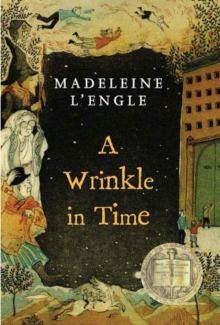 A Wrinkle in Time
A Wrinkle in Time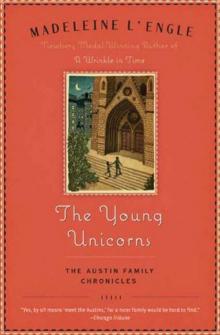 The Young Unicorns
The Young Unicorns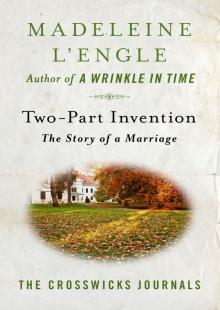 Two-Part Invention: The Story of a Marriage
Two-Part Invention: The Story of a Marriage The Other Side of the Sun
The Other Side of the Sun A House Like a Lotus
A House Like a Lotus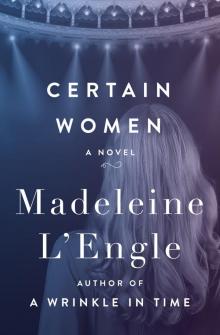 Certain Women
Certain Women Many Waters
Many Waters Camilla
Camilla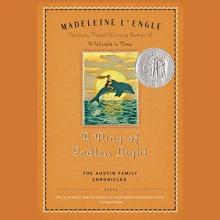 A Ring of Endless Light
A Ring of Endless Light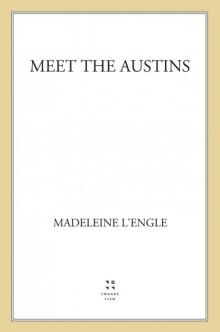 Meet the Austins
Meet the Austins Dragons in the Waters
Dragons in the Waters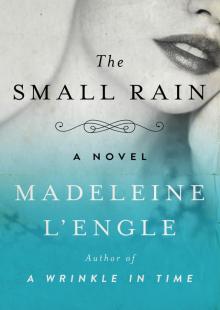 The Small Rain
The Small Rain The Moment of Tenderness
The Moment of Tenderness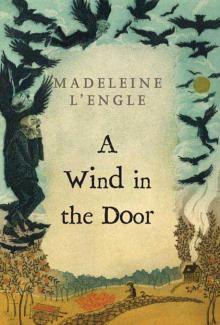 A Wind in the Door
A Wind in the Door Miracle on 10th Street
Miracle on 10th Street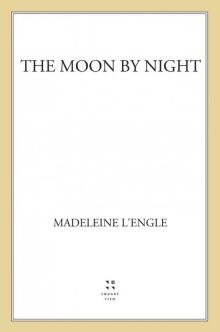 The Moon by Night
The Moon by Night A Swiftly Tilting Planet
A Swiftly Tilting Planet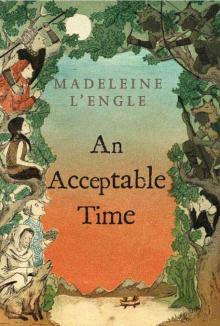 An Acceptable Time
An Acceptable Time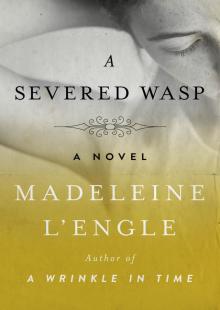 A Severed Wasp
A Severed Wasp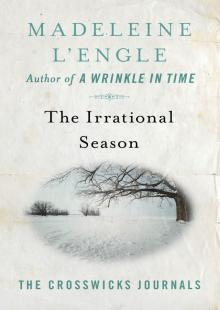 The Irrational Season
The Irrational Season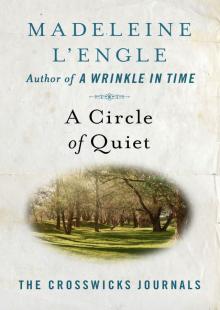 A Circle of Quiet
A Circle of Quiet A Live Coal in the Sea
A Live Coal in the Sea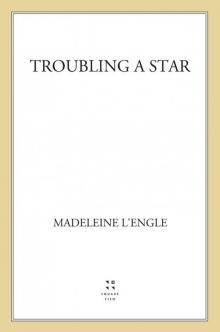 Troubling a Star
Troubling a Star Walking on Water: Reflections on Faith and Art
Walking on Water: Reflections on Faith and Art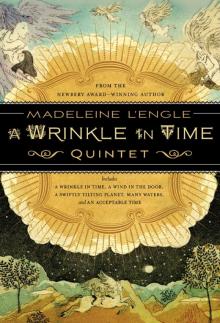 A Wrinkle in Time Quintet
A Wrinkle in Time Quintet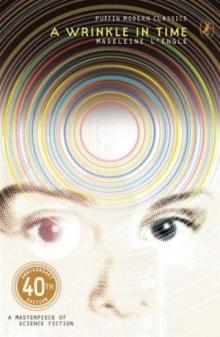 Wrinkle in Time
Wrinkle in Time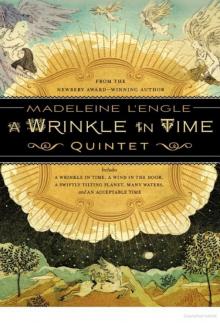 The Wrinkle in Time Quintet
The Wrinkle in Time Quintet Intergalactic P.S. 3
Intergalactic P.S. 3 Walking on Water
Walking on Water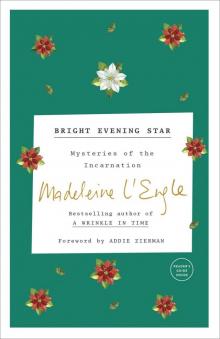 Bright Evening Star
Bright Evening Star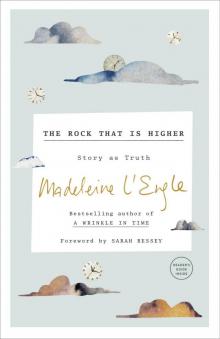 The Rock That Is Higher
The Rock That Is Higher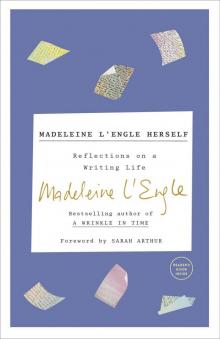 Madeleine L'Engle Herself
Madeleine L'Engle Herself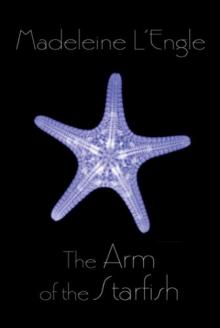 The Arm of the Starfish
The Arm of the Starfish And Both Were Young
And Both Were Young The Twenty-four Days Before Christmas
The Twenty-four Days Before Christmas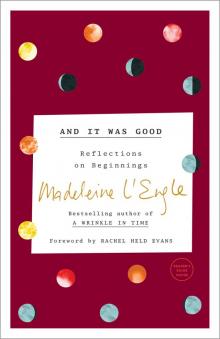 And It Was Good
And It Was Good A Stone for a Pillow
A Stone for a Pillow Do I Dare Disturb the Universe?
Do I Dare Disturb the Universe?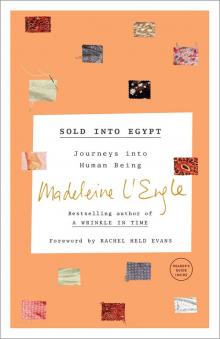 Sold into Egypt
Sold into Egypt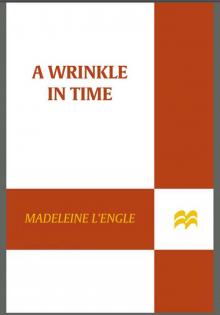 A Wrinkle in Time (Madeleine L'Engle's Time Quintet)
A Wrinkle in Time (Madeleine L'Engle's Time Quintet)